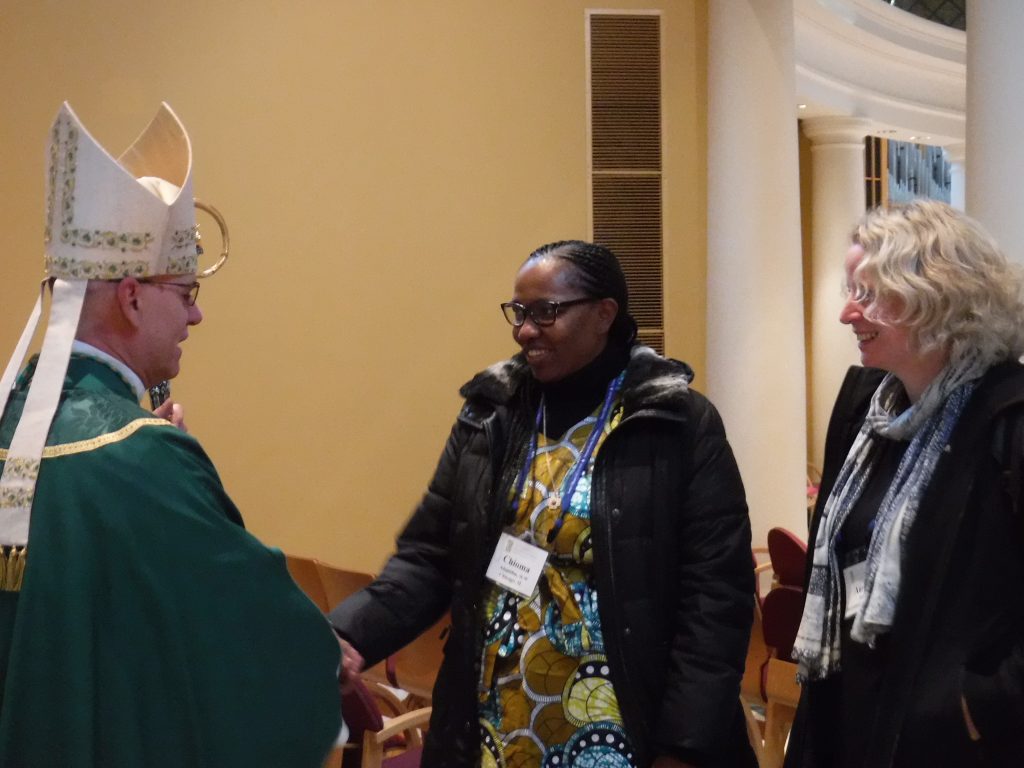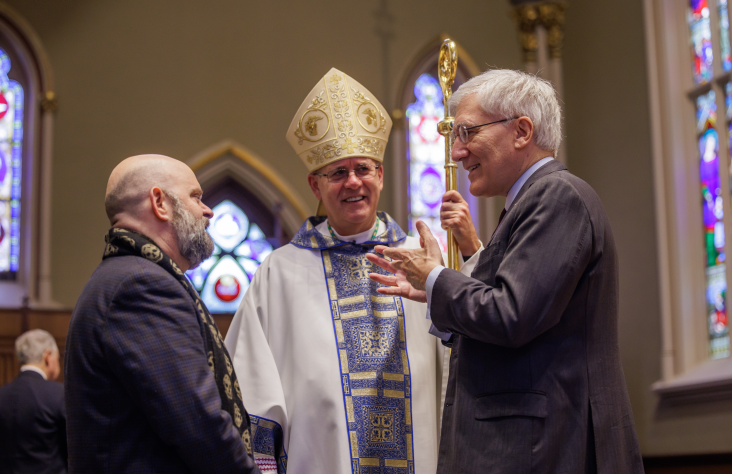October 24, 2019 // Diocese
Women of the Church conference: ‘I just feel so seen’
At a vigil Mass for the 29th Sunday of Ordinary Time, Bishop Kevin C. Rhoades celebrated the liturgy of the Eucharist with faith-filled participants of the Women of the Church Conference, hosted by Saint Mary’s College, Notre Dame. A wide range of generations of women participated, representing a variety of religious and lay roles of ministry in the Church and equipping the conference to offer a fresh voice of faithfulness from the female perspective.
The original Women of the Church conference took place in 2016 at Saint Meinrad Seminary and School of Theology, hosted by the Sisters of St. Benedict of Ferdinand. Building on its success, the second conference focused on the diverse work of women in the Catholic Church and in the world. It examined how their leadership is a source of strength and knowledge, and imagined new possibilities for women as leaders in the Church.
With the motto, “Women of the Church: Strength of the past, Hope for tomorrow,” a vision of living, faithful, active participation in the Church was addressed via a variety of theological and pastoral lenses.

Bishop Kevin C. Rhoades greets worshippers after celebrating a vigil Mass Oct. 19 during the Women of the Church conference hosted by Saint Mary’s College, Notre Dame. The keynote speakers, below, and other presenters encouraged the women present to help them bring into the light the leadership of women in the Church. —Jennifer Miller
Bishop Rhoades spoke about the vision in his homily, fleshing out the Gospel of Luke 18:1-8 and the first reading from Exodus. He connected Jesus’ words to the actions of the saints and doctors of the Church, specifically St. Monica, St. Catherine of Siena and St. Teresa of Avila, and then to the current reality of the faithful present.
“God invites us to pray insistently,” he said. “This isn’t because He is unaware of our needs or because He is not listening to us when we pray. On the contrary, He is always listening and He knows everything about us and our life. The Lord is calling us to relationship with Him. Persevering prayer is the expression of faith in God. He wants us to trust that He listens to us.
When we pray, “we lift up our minds and hearts to the Lord,” he continued. “Prayer is an expression of our faith and our hope in the power of God who is Love and does not abandon us. Prayer gives us the strength to fight the good fight of the Gospel. Prayer is the weapon of the poor in spirit and the lowly. It was the weapon of Mary and all the saints. And it requires faith.”
Speaking of spiritual ancestors of faith, he explained, “Many of us learned to pray from our mothers and grandmothers. We can also learn from so many great women of the Church, like St. Monica who prayed for many years for the conversion of her wayward son, St. Augustine. Eventually her prayers were answered in ways she never thought imaginable. Her son not only converted; he became one of the greatest Fathers and Doctors of the Church.”
St. Teresa of Avila, whose feast day was just celebrated the past week, found it challenging to pray during the first 20 years of her religious life. “But she experienced a conversion. She felt the sensation of Christ’s love transforming her, which moved her not only to be faithful to prayer for the rest of her life, to reach the heights of contemplative prayer, but also to reform the Carmelites to return to their original spirit of poverty, enclosure and disciplined prayer. Teresa helps us to understand the hard work of beginning prayer and the determination it requires.”
In fact, the bishop added, it is her definition of mental or contemplative prayer that is contained in the Catechism. “It is nothing else than a close sharing between friends; it means taking time frequently to be alone with Him who we know loves us.”
He shared that in his own chapel, he has her words in Spanish, on the wall. “Let nothing disturb you, nothing dismay you. All things are passing, God never changes. Patient attains all things … God alone suffices.”
Bishop Rhoades remembered and prayed for the soul of Sister Maura Brannick, CSC, who passed into eternal life on the first day of the conference. Sister Brannick’s compassionate medical advocacy with underserved families in the South Bend area was much admired. A health center in the city is named in her honor.
For participant Montel Menting, the highlight of the conference was a discussion about prayer and liturgy during the time of the sexual abuse crisis in the Church; specifically, how one prays during such trauma.
Presenter and participant Stacey Noem, M.Div., of the University of Notre Dame, found the times of community gathering and prayer fruitful. The moments that impacted her most, she said, were “anytime we opened our mouths to sing at prayer or Mass or dinner together. The feminine timber was so noticeable.
“I realized how often we are overshadowed or dominated by male voices. Perhaps that is metaphorical. Likely it is, and bears more reflection. But it was just physically something I noticed.”
Dr. Layla Karst, both a presenter and participant from Loyola Marymount University, Los Angeles, said she found the conference refreshing.
“After Dr. Cecilia Gonzalez-Andrieu’s talk, one participant stood up and thanked her by saying, ‘I just feel so seen.’ This, to me, captured the primary importance of the conference — an opportunity to gather together, to tell our own stories and listen to other’s, to see other, diverse women in leadership roles in the Catholic church and to be seen ourselves,” Karst reflected. “In a Church that often encourages women’s leadership as long as it is done quietly and behind the scenes, being seen and heard allows us to begin to contemplate together the question of ‘what’s next’ for women in the Church.”
At the conference, there were women who have been mentors and companions of Karst’s on the journey of study and formation — her co-workers in the vineyard, and her fellow theologians, she shared. “This is evidence of women not only talking about doing church, but actually doing church — discerning with one another, encouraging and when necessary correcting one another, and celebrating what God is doing in our midst.”
The best news. Delivered to your inbox.
Subscribe to our mailing list today.






